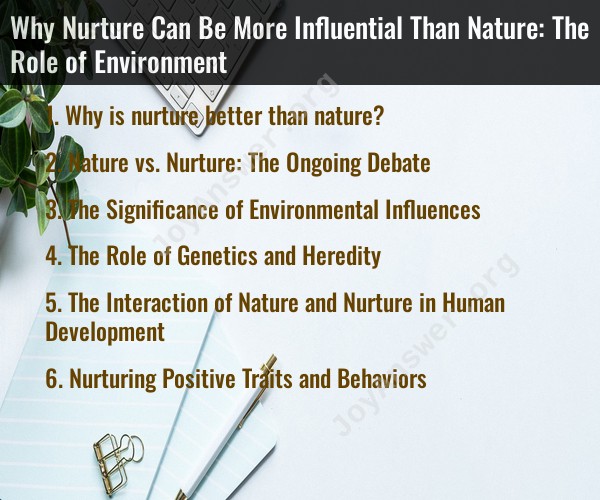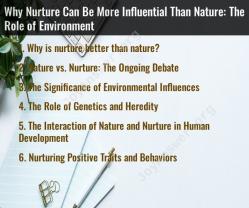Why is nurture better than nature?
The debate between nature (genetics) and nurture (environment) as to which has a greater influence on human development and behavior is a complex and ongoing one. It's important to note that it's not a matter of one being "better" than the other; rather, it's about understanding the significant role that both nature and nurture play in shaping an individual. Here are some reasons why nurture, or the environment, is often considered influential:
Environmental Factors Shape Behavior: The environment in which a person grows up can have a profound impact on their behavior and development. Factors such as family, culture, education, and socioeconomic conditions can significantly influence a person's values, beliefs, and behaviors.
Learning and Adaptation: The environment provides opportunities for learning and adaptation. Through interactions with the environment and exposure to various stimuli, individuals acquire knowledge, skills, and behaviors that are essential for their development.
Impact of Early Childhood: Early experiences, particularly in childhood, can have lasting effects on an individual's development. Positive and nurturing environments during these formative years can lead to better outcomes in terms of physical and mental health, social skills, and cognitive development.
Cultural and Social Norms: The values and norms of the society in which a person is raised can shape their behaviors and beliefs. Cultural and social factors often play a central role in determining the trajectory of an individual's life.
Psychological Development: Environmental influences can significantly impact psychological development. Factors such as trauma, stress, or a lack of supportive relationships can lead to psychological challenges, while positive environments can contribute to emotional well-being.
Education and Opportunities: Access to education and opportunities, which are largely determined by the environment, can be instrumental in a person's development and success. The quality of education, availability of resources, and support systems in the environment all contribute to an individual's growth.
Behavioral Changes: Environmental factors can also lead to behavioral changes and adaptations in response to challenges or opportunities. The environment can shape an individual's resilience, problem-solving skills, and ability to cope with life's challenges.
Interventions and Support: In many cases, individuals who have faced adverse circumstances can benefit from interventions and support systems within their environment. Therapeutic, educational, and social interventions can positively influence an individual's life path.
It's important to emphasize that nature and nurture are interlinked and interact with each other. Genetics (nature) provide a biological foundation, but the environment (nurture) can modify and shape genetic predispositions. The relative influence of nature and nurture can vary depending on the specific trait or behavior being considered.
In summary, the role of nurture (environment) is not necessarily "better" than nature (genetics), but it is undeniably influential in shaping human development and behavior. Recognizing the significance of the environment and understanding how it interacts with genetics is crucial for a comprehensive understanding of human nature.
Nature vs. Nurture: The Ongoing Debate
The nature vs. nurture debate is the ongoing discussion about the relative importance of genetics (nature) and environment (nurture) in shaping human development. Traditionally, the debate has been framed as a dichotomy, with one side arguing that nature is the dominant factor and the other side arguing that nurture is.
However, most scientists now agree that both nature and nurture play important roles in human development. The interaction of genes and environment is complex and multifaceted, and it varies from person to person and trait to trait.
The Significance of Environmental Influences
The environment encompasses all of the factors that influence a person's development, including their upbringing, education, relationships, and social and cultural context. Environmental influences can have a significant impact on a person's physical and mental health, cognitive abilities, personality, and behavior.
For example, children who are raised in loving and supportive environments are more likely to be healthy and well-adjusted adults. Children who are exposed to trauma or abuse are more likely to experience health and behavioral problems.
The Role of Genetics and Heredity
Genetics is the study of how traits are passed down from parents to offspring. Heredity is the process by which genes are transmitted from parents to offspring. Genes influence a wide range of human traits, including physical characteristics, cognitive abilities, personality traits, and susceptibility to disease.
For example, some people are genetically predisposed to certain diseases, such as cancer or heart disease. Others are genetically predisposed to certain personality traits, such as introversion or extroversion.
The Interaction of Nature and Nurture in Human Development
Nature and nurture interact in complex ways to shape human development. For example, a child's genetic predisposition to a certain disease may not be activated unless they are exposed to a certain environmental trigger. Similarly, a child's genetic predisposition to a certain personality trait may be expressed differently depending on their upbringing and environment.
For example, a child who is genetically predisposed to introversion may be more likely to withdraw from social situations if they are raised in a chaotic or unpredictable environment. However, the same child may be more likely to express their social side if they are raised in a supportive and nurturing environment.
Nurturing Positive Traits and Behaviors
Parents and caregivers can play an important role in nurturing positive traits and behaviors in children. Here are some tips:
- Provide a loving and supportive environment.
- Set clear and consistent expectations.
- Be a positive role model.
- Encourage children to explore their interests and talents.
- Praise children's efforts and accomplishments.
- Help children to develop healthy coping mechanisms.
By understanding the interaction of nature and nurture, parents and caregivers can help children to reach their full potential.


